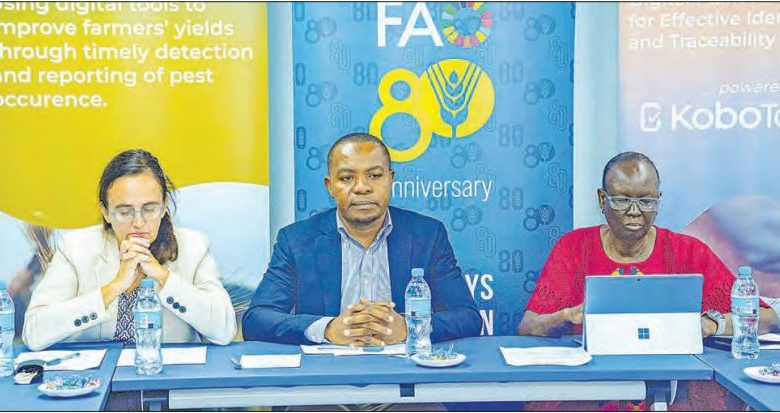EU and FAO boost Tanzania’s plant health systems

DAR ES SALAAM: TANZANIA’S agricultural sector is now experiencing a quiet revolution. No, it is not another flashy summit or a hastily launched blueprint; it is something more practical, technical and yes, full of lab coats and clever acronyms.
Thanks to strong financial and technical support from the European Union (EU) and the Food and Agriculture Organisation (FAO), the country is giving its plant health systems a 21st-century upgrade.
Think: Digital tools, drones, DNA tech and an actual training academy (more on that later).
At the centre of it all is the rather scientific-sounding but impact-packed project: STREPHIT (Strengthening Plant Health Services in Tanzania for Enhanced Food Safety) that is an initiative that has, over the past four years, quietly transformed Tanzania’s plant health landscape.
And now, with the launch of the STREPHIT Stakeholder Workshop Series in Dar es Salaam, the project is shifting gears from “installation” to “institutionalisation.”
The progress is already visible. The funding has led to rehabilitated laboratories, digital inspection tools, export dossier preparation and the launch of the Phytosanitary Learning Academy of Technical Excellence (PLATE)-a name that might confuse those looking for a good buffet, but is actually a sustaining training centre and capacity development in plant health servicesfor plant health professionals.
The workshop series brings together government officials, researchers, development partners and private sector representatives to reflect on achievements and map out the road ahead. Spoiler: the road is paved with innovation. Why all the fuss? Because agriculture is no small matter in Tanzania.
It employs roughly 65 per cent of the population and remains a key driver of Gross Domestic Product (GDP) and export earnings.
But it has also been plagued and literally by pests, diseases and limited technical capacity. Enter STREPHIT with its digital charms: Harmonising plant health regulations (goodbye, conflicting paperwork), rolling out digital certification systems, deploying drones for surveillance and bringing in DNA sequencing tools to identify crop enemies in record time.
Move over Sherlock Holmes-Tanzania now has the Plant Health Biosafety Intelligence Unit, a body that sounds like it should be cracking international espionage but is actually protecting your tomatoes and maize.
Speaking at the workshop, Dr Mohamed Dhamir, Director of Agriculture and Food Security in Zanzibar, highlighted the real, on-the-ground value of the project.
“We must safeguard these milestones,” he said and in translation: This is not a oneoff project that should fade with the final donor cheque.
Dr Dhamir also pointed out some growing pains: The need for sustainable financing, eco-friendly biopesticides and integrating plant health with nutrition and value chains.
ALSO READ: Inclusive growth and climate action in Zanzibar
Basically, don’t stop at drones, it connects the dots from the field to the plate (the eating kind, not the acronym).
Representing the Ministry of Agriculture, Dr Alli Khamis noted Zanzibar’s gains: Better labs, digital inspections and boosted capacity for export compliance.
Not bad for an island that should be part of mainland innovation narratives. Farmers reap what tech sows While the terminology might sound academic, the results are felt on the farm.
Healthier crops mean higher yields, fewer losses and stronger market access-both regional and international. That means more income in farmers’ pockets and better food security in homes.
And let us be honest, that is a far better pitch to Tanzanians. The FAO Representative in Tanzania, Dr Nyabenyi Tipo, made a sharp point: “This is not just a technical exercise… It’s about ensuring smallholder farmers have access to safe, profitable markets and resilient food systems.”
In other words, the technology is great, but unless it is embedded in real institutions and backed by real budgets, it could end up gathering digital dust.
That is where institutionalisation comes in. The next phase of STREPHIT is not just about rolling out gadgets, it is about making them part of the official national agricultural framework.
That includes: Building long-term human capacity; Strengthening interagency collaboration; Ensuring private sector engagement.
PLATE will play a key role here, offering continuous training for plant health professionals to keep the skills and knowledge flowing even after the drone batteries run out.
Europe’s hand in the soil The European Union reaffirmed its support for STREPHIT, aligning it with its broader goals of sustainable agriculture, climate resilience and inclusive economic growth.
Silvia Giner Salvia, Programme Manager at the EU Delegation, summed it up nicely: “These achievements are not just technical. They are strategic investments in food security and rural livelihoods.”
In short, this is not just donor money for a press release. It is funding that feeds into systems Tanzanians will rely on long after the banners come down.
In a nutshell, the STREPHIT Workshop Series, which will run over the next three weeks, is set to unpack challenges like: How to sustain progress; Dealing with climate change and new pest threats; Ensuring continued local ownership of solutions.
Participants from government, academia, civil society and the private sector will use this time to draft actionable policy briefs and investment concepts to future-proof the system.
In a way, Tanzania is making it clear: It is not just reacting to agricultural threats, it is planning ahead, using smart tech and smarter strategies.
With FAO and EU support, the country is stepping into a future where farmers are more informed, crops are better protected and trade doors are wide open.
It is a long road ahead, but if drones, DNA and a PLATE of knowledge are anything to go by, it is one worth following





